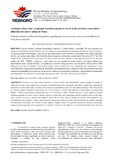Avaliação crítica sobre a legislação brasileira quanto ao uso de ácido ascórbico como aditivo alimentar em sucos e polpas de frutas

Visualizar/
Data
2021-01-02Autor
da Costa, Ana Paula
Coelho, Raquel
Metadado
Mostrar registro completoResumo
Ascorbic acid, also called vitamin C, is water-soluble and thermolabile. Human beings are unable to synthesize ascorbic acid, so they rely essentially on food through fruits, vegetables and offal to supply their demand. In addition to its nutritional value, ascorbic acid is used as a food additive due to its antioxidant character. This work aimed to critically analyze Normative Instructions No. 37 of October 1, 2018, of the Ministry of Agriculture, Livestock and Supply - MAPA and Normative Instruction No. 37, of October 1, 2018 - MAPA: the first, which requires a content minimum amount of ascorbic acid of natural origin for certain fruit juices and pulps; and the second because, at the same time, it allows the use of ascorbic acid additive (INS 300) for these types of drinks. From this critical analysis, this contradiction was evidenced, which compromises the inspection action to comply with the identity and quality standards for fruit juices and pulps, as it allows to mask quality changes caused by reported post-harvest failures, processing, transport and storage due to the degradation of vitamin C. The use of this additive for such drinks should not be allowed.



